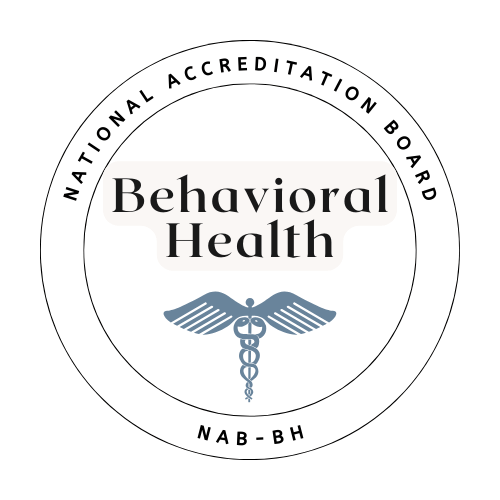National Accreditation Board
for Behavioral Health
Board Certified with NAB-BH Accreditation
The National Accreditation Board for Behavioral Health is dedicated to promoting professionalism, accountability, and consistency among institutions and professionals in various sectors of behavioral health, including counseling, mental health, psychiatry, psychology, social services, substance use and addiction, and other areas of behavioral health.
NAB-BH plays an essential role in upholding the integrity and quality of care by:
- Establishing industry standards and best practices
- Ensuring the quality and credibility of micro-certification or certification-granting institutions
- Providing credibility and trust by verifying credentials for qualifications and skills to perform work-related duties
- Building industry-wide consistency
- Ensuring public safety and welfare
- Professional Empowerment
Accreditation
The accreditation of your certificaiton-granting institution for high quality education and workforce training offers several benefits, including the following advantages:
Quality Assurance
Consistency in Standards: Accreditation ensures that a micro-certification or certification-granting institution or organizaiton meets established quality standards, which helps maintain consistency in behavioral health training and education.
Continuous Improvement: Accredited bodies are regularly reviewed, promoting continuous improvement and updating their curricula to stay relevant and effective.
Credibility and Reputation
Public Trust: Being accredited signals to the public that the organization is trustworthy, qualified, and capable of meeting high standards.
Recognition: Accreditation from a recognized body enhances an institution’s or company’s reputation and standing in its field.
Funding and Partnerships
Financial Opportunities: Some funding agencies, government programs, or private investors may only provide funding to accredited organizations, knowing they are meeting quality and performance benchmarks.
Partnership Opportunities: Accreditation can open doors to partnerships with other reputable organizations that value recognized standards.
Accountability
External Evaluation: Accreditation requires insititutions or organizations to undergo a rigorous evaluation process, which helps them remain accountable to both their internal stakeholders and the broader public.
Transparency: Accreditation ensures that an organization’s processes and practices are transparent and meet established criteria for excellence.
Market Differentiation
Competitive Advantage: Accreditation sets an organization apart from competitors who are not accredited. This can help attract more clients, students, or customers who value quality and standards.
Brand Recognition: It serves as a mark of quality that sets apart your level of academic education and workforce training from those offered at other institutions.
Compliance with Regulatory Requirements
Legal and Regulatory Alignment: In some industries, accreditation ensures compliance with relevant laws and regulations, helping organizations avoid legal issues.
Certifications
Becoming certified offers professionals several benefits, including the following advantages:
Experience and Knowledge
Certification typically requires specific training, education, and understanding of best practices. This ensures that the certified individual has a solid foundation of knowledge to provide effective care or support.
Evidence-Based Practices
Certified professionals are often trained in evidence-based practices, meaning they use techniques and interventions that are supported by scientific research to improve outcomes.
Ethical and Professional Standards
Certification often involves adhering to a code of ethics and professional standards, which helps ensure that the certified individual behaves respectfully, compassionately, and trustworthyly. This is especially important in a field that involves sensitive personal issues.
Credibility
Certification is a recognized indicator that the person has met a certain level of competency in mental health care. This gives clients and employers confidence in their abilities.
Continued Learning
Many certifications require ongoing education or training, which encourages certified professionals to stay current with the latest trends, research, and techniques.
Licensing and Legal Considerations
In some cases, certification requires licensure, which is a requirement to practice legally in certain fields (e.g., psychiatry, psychotherapists, counselors, or psychologists). This ensures that only qualified individuals offer mental health care services to the public.

